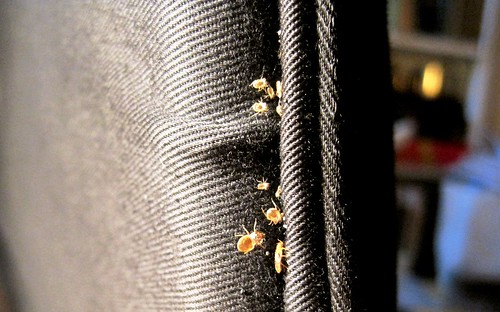It is said, on one of the many Web sites dealing with the subject, that bed bugs, when they attack their sleeping victims, leave a trail of “dark fecal spots (which are partly digested blood) on their host, mattresses, clothes, bedding, walls, ceiling, and every place you can imagine in a room.”
Except, it seems, when they don’t. Except when you are preyed upon by bed bugs who come equipped with their own federally funded clean-up crew — bugs which don’t feed but tidy up after the other bugs — ensuring that the dawn will reveal absolutely no sign of their vampiric brethren except for the clusters of hideous, madly itching welts on your legs and arms and torso.
This is the situation as I lie awake in bed at three in the morning, a copy of George Eliot’s “Middlemarch” propped up on a small cushion in front of me. I’m about 420 pages in, with about 420 pages to go, but it’s a challenge to concentrate. I keep swiveling around thinking I’ll catch a bug scooting purposefully toward me on the pristine sheet. I turn a flashlight on the curls of peeling paint behind the heating pipe and under the window sill, looking for anything that scurries…. Surely there must be something moving somewhere. After all, it’s feeding time.
How many bed bugs might there be? According to the site quoted above, “a mere 40 bed bugs can grow to an army of 6,000 in six months” simply by feeding off one person. Here they have two. I suppose the bugs must take turns. “No, after you, Henry. I ate heartily last night. Emily, you haven’t fed since Thursday, if I’m not mistaken. You’ll turn anorexic if you’re not careful. Go on ahead now….”
My wife, who has suffered far more from the bugs than me, has decamped to the narrow sofa bed in the living room in an effort to escape these horrors, leaving me alone with the good citizens of “Middlemarch.” Those 19th century men and women would have been all too familiar with this scourge, although if the novel’s principal characters are scratching themselves, it hasn’t been mentioned. Out in the countryside, however, where “the pauper labourers in ragged breeches” live in wormy cottages, it must be a different story.
In about 12 hours I will discover where the bugs are, or at least some of them. A minor infestation, though not in the bedroom. For now I know nothing. What fills me with despair is the apartment itself — its walls with cracks an inch deep, the bathroom tiles either missing or bulging at odd angles, the sagging, lopsided floors scarred by gaps and holes, the rotten window frames and sash cords, the bathtub drain that doesn’t drain, the myriad threadlike passages with which fast-moving bugs the size of apple seeds can traverse an entire building as if they were hurtling down freeways.
And then the possessions! The clothes, books, records, CDs, photographs, DVDs, videos, paintings, family heirlooms, tools, pens, papers, carpets, bills, receipts, tax records, candle sticks, letters, staplers, vases, diaries, printers, suitcases, plastic bags, credit cards, sheets, towels, and blankets, the 60 lb. Sony TV, a maze of wires and plugs and power circuits and ear buds and noise-canceling head phones and blinking wi fi boxes that connect to Firefox and Netflix and Hulu….
With some exceptions, many of these things should already have vanished, transposed to the noncorporeal world of the wireless Internet, now plagued by so many viruses and infections and hackers it’s officially been declared a “war zone” by the Pentagon. (A war zone, right at your fingertips!) I have records, but nothing to play them on. CDs, but only a broken CD player. (The DVD-video player has given out, too.) A Kindle sits on a shelf, encased in a pebbly black leather cover, as slim and studious-looking as if it were one of Bruce Chatwin’s Patagonian moleskin diaries, challenging me to dispense with all but my most precious books (which even George Eliot describes in “Middlemarch” as “the drifted relics of all time”) and embrace the slippery digital realm, where the bugs are electronic, head-on.
“As you get older,” Gore Vidal famously joked, “litigation replaces sex.” I am currently engaged in, or heading toward, litigation. Patricia Highsmith wrote that ultimately life boils down to real estate. I am obsessed with the idea of “home,” but I no longer know where “home” is. If I have an internal compass, then the needle is broken. When you are 25, apartments are places you glide through as casually as if they were rooms in a gigantic mansion. Only later do you learn they are more like fortresses owned by someone else — hard to get into, and hard to get out of.
Tomorrow afternoon, I will find the bed bugs. Some of them, at any rate. The next day, the inspectors from pest control will arrive, possibly bearing grim tidings. Before they get here, an armchair and a foot stool will already have been thrown to the sidewalk. I feel as if my life is about to receive a sternly worded makeover, that it will be pared down to its fumigated essentials, and that this apartment will soon take on the austere, monkish look that is now so à la môde.
The bed bugs are not just biting me, they are provoking existential questions. What gives life value? What is the importance of objects? Should a middle-aged couple occupy an East Village walk-up or cede it to yet more students? With mass unemployment looming, what is going to happen to New York?
Feverishly I scratch myself, apply prescription-strength cortisone to my livid blotches and welts, gulp some lemony water, and finally — finally! — fall asleep.
Which, of course, is just what the bed bugs have been waiting for.






